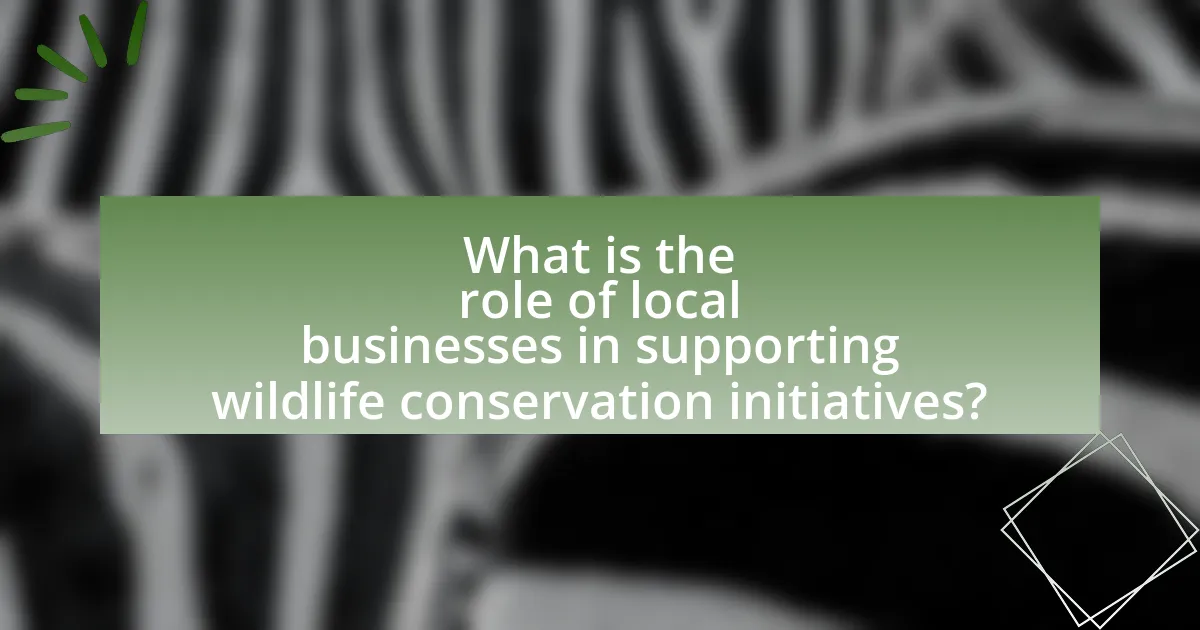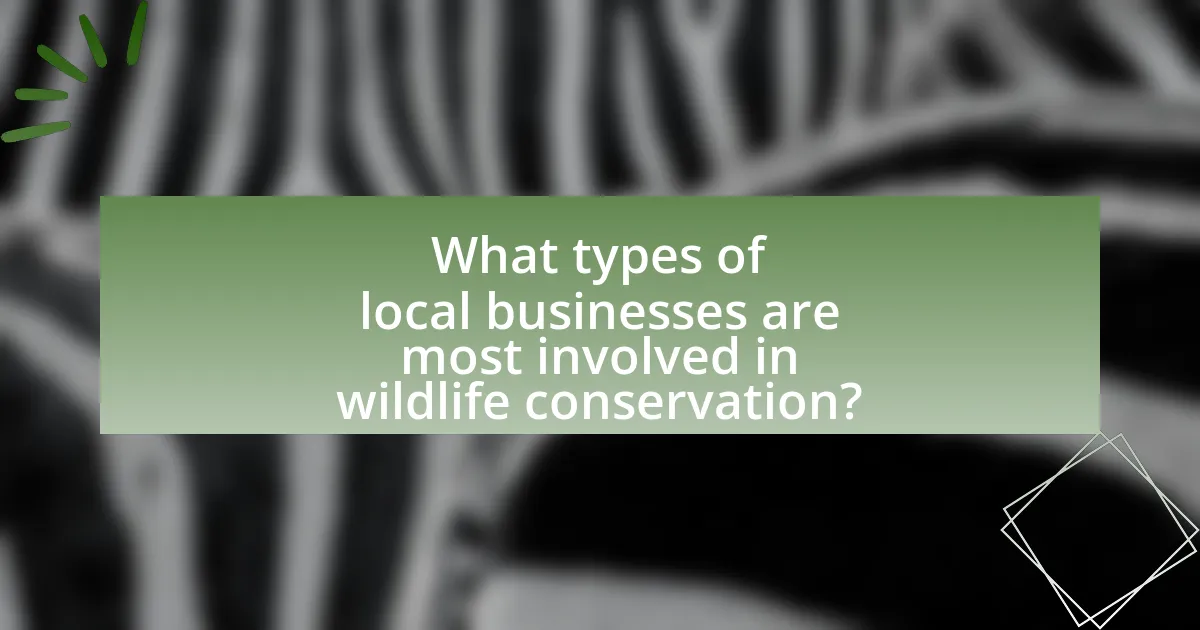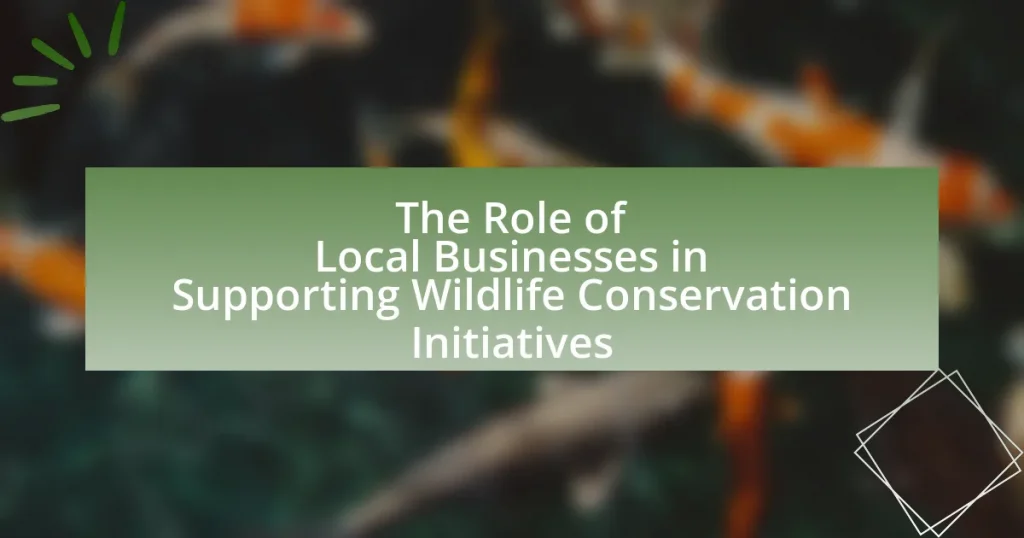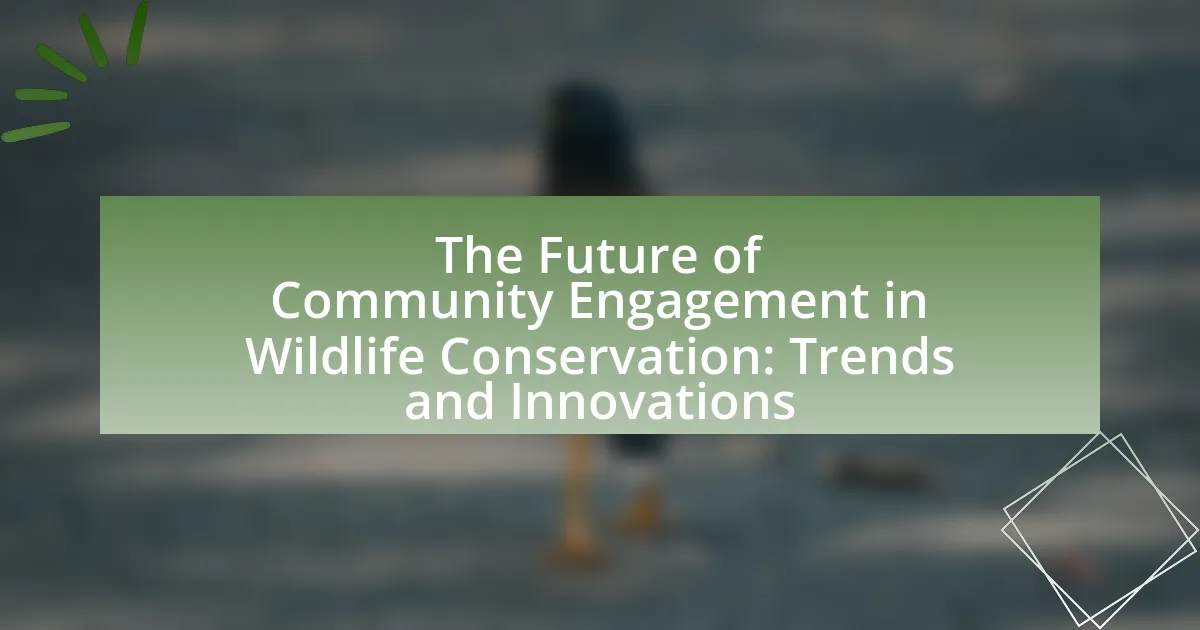Local businesses play a vital role in supporting wildlife conservation initiatives through financial contributions, resource sharing, and community engagement. They engage in partnerships with environmental organizations, fund local conservation projects, and promote sustainable practices that benefit ecosystems. By participating in educational events and community clean-up efforts, local businesses raise awareness about wildlife issues and foster a culture of environmental stewardship. This article explores the specific actions taken by local businesses, the sectors most involved in conservation, and the challenges they face, highlighting successful examples and strategies for effective engagement in wildlife conservation efforts.

What is the role of local businesses in supporting wildlife conservation initiatives?
Local businesses play a crucial role in supporting wildlife conservation initiatives by providing funding, resources, and community engagement. They often contribute financially to conservation projects, which can include habitat restoration and wildlife protection efforts. For instance, a study by the World Wildlife Fund found that local businesses that engage in sustainable practices can increase their revenue while simultaneously supporting local ecosystems. Additionally, local businesses can raise awareness about conservation issues through marketing and community events, fostering a culture of environmental stewardship among their customers. This symbiotic relationship not only benefits wildlife but also enhances the businesses’ reputation and customer loyalty.
How do local businesses contribute to wildlife conservation efforts?
Local businesses contribute to wildlife conservation efforts by funding local conservation projects and promoting sustainable practices. For instance, many businesses engage in partnerships with environmental organizations to support habitat restoration initiatives, which directly benefit local wildlife populations. Additionally, local businesses often adopt eco-friendly practices, such as reducing waste and using sustainable materials, which help minimize their ecological footprint and protect natural habitats. According to a study by the World Wildlife Fund, businesses that implement sustainable practices can significantly reduce their environmental impact, thereby aiding in wildlife conservation.
What specific actions do local businesses take to support conservation initiatives?
Local businesses support conservation initiatives through actions such as funding local wildlife projects, participating in community clean-up events, and promoting sustainable practices. For instance, many businesses contribute financially to organizations focused on habitat restoration, which directly aids in preserving local ecosystems. Additionally, local businesses often engage their employees and customers in environmental clean-up efforts, fostering community involvement and awareness. Furthermore, they may adopt sustainable practices, such as reducing plastic use or sourcing materials responsibly, which collectively contribute to conservation goals. These actions not only enhance the local environment but also demonstrate a commitment to sustainability that can resonate with consumers, thereby reinforcing the importance of conservation initiatives.
How do local businesses collaborate with conservation organizations?
Local businesses collaborate with conservation organizations through partnerships that often include financial support, resource sharing, and joint community initiatives. For instance, businesses may sponsor conservation projects, provide in-kind donations such as materials or services, and engage in co-hosted events that raise awareness about environmental issues. A notable example is the collaboration between local restaurants and wildlife conservation groups, where a portion of sales is donated to support habitat restoration efforts. This synergy not only enhances the visibility of conservation efforts but also fosters community engagement, as seen in initiatives like beach clean-ups organized by local shops in partnership with environmental nonprofits.
Why is the involvement of local businesses crucial for wildlife conservation?
The involvement of local businesses is crucial for wildlife conservation because they provide essential funding, resources, and community engagement that support conservation initiatives. Local businesses often contribute financially through sponsorships or donations, which can directly fund conservation projects, such as habitat restoration or wildlife protection programs. For example, a study by the World Wildlife Fund found that partnerships with local businesses can increase funding for conservation efforts by up to 30%. Additionally, local businesses can raise awareness and foster community involvement, encouraging residents to participate in conservation activities, thereby creating a collective effort towards protecting wildlife.
What impact do local businesses have on community awareness of wildlife issues?
Local businesses significantly enhance community awareness of wildlife issues by engaging in educational initiatives and promoting conservation efforts. These businesses often serve as platforms for local wildlife organizations, hosting events, workshops, and informational campaigns that inform the public about local wildlife challenges and conservation strategies. For instance, a study by the National Wildlife Federation found that businesses that partner with conservation groups can increase community participation in wildlife protection activities by up to 40%. This collaboration not only raises awareness but also fosters a sense of responsibility among community members towards local wildlife preservation.
How does local business support enhance funding for conservation projects?
Local business support enhances funding for conservation projects by providing financial resources, in-kind donations, and community engagement. When local businesses contribute funds, they directly increase the budget available for conservation initiatives, allowing for more comprehensive project planning and execution. For instance, a study by the National Fish and Wildlife Foundation found that partnerships with local businesses can lead to a 30% increase in funding for conservation efforts. Additionally, businesses often engage their customers and employees in conservation activities, raising awareness and encouraging further donations. This collaborative approach not only amplifies financial support but also fosters a community culture that values and prioritizes conservation efforts.

What types of local businesses are most involved in wildlife conservation?
Local businesses most involved in wildlife conservation include eco-tourism companies, wildlife rehabilitation centers, and organic farms. Eco-tourism companies promote responsible travel that supports conservation efforts and local ecosystems, often contributing a portion of their profits to wildlife protection initiatives. Wildlife rehabilitation centers focus on rescuing and rehabilitating injured or orphaned animals, providing essential care and education about local wildlife. Organic farms often implement sustainable practices that protect habitats and promote biodiversity, aligning their operations with conservation goals. These businesses play a crucial role in fostering community awareness and financial support for wildlife conservation efforts.
Which sectors of local businesses are leading in conservation efforts?
The sectors of local businesses leading in conservation efforts include agriculture, tourism, and retail. Agriculture businesses are implementing sustainable farming practices to reduce environmental impact, such as organic farming and water conservation techniques. The tourism sector promotes eco-friendly practices, such as wildlife tours that support conservation and local ecosystems. Retail businesses are increasingly adopting sustainable sourcing and packaging, with many committing to reducing plastic use and supporting local artisans. These sectors collectively contribute to wildlife conservation initiatives by promoting sustainable practices and raising awareness among consumers.
How do tourism-related businesses contribute to wildlife conservation?
Tourism-related businesses contribute to wildlife conservation by generating revenue that supports conservation efforts and promoting awareness of environmental issues. For instance, eco-tourism initiatives often allocate a portion of their profits to local conservation projects, such as habitat restoration and anti-poaching programs. According to a study by the World Wildlife Fund, eco-tourism can provide up to 30% of funding for conservation in certain regions, demonstrating its financial impact. Additionally, these businesses educate tourists about local wildlife and ecosystems, fostering a culture of conservation and responsible tourism. This dual approach of financial support and education enhances the effectiveness of wildlife conservation initiatives.
What role do agricultural businesses play in supporting wildlife initiatives?
Agricultural businesses play a crucial role in supporting wildlife initiatives by implementing sustainable farming practices that enhance biodiversity. These practices include creating wildlife corridors, preserving natural habitats, and reducing pesticide use, which collectively contribute to healthier ecosystems. For instance, a study by the World Wildlife Fund found that farms adopting integrated pest management can reduce chemical inputs by up to 50%, thereby benefiting surrounding wildlife populations. Additionally, agricultural businesses often collaborate with conservation organizations to promote land stewardship programs, which further support wildlife conservation efforts.
What are some successful examples of local businesses supporting wildlife conservation?
Local businesses such as Patagonia, a clothing retailer, and local coffee shops that donate a portion of their profits to wildlife conservation organizations exemplify successful support for wildlife conservation. Patagonia has committed over $100 million to environmental causes, including wildlife conservation, through its 1% for the Planet initiative. Additionally, many local coffee shops partner with organizations like the World Wildlife Fund, contributing funds from specific products to support conservation efforts. These examples demonstrate how local businesses can effectively contribute to wildlife conservation through financial support and community engagement.
How have specific local businesses made a measurable impact on conservation efforts?
Specific local businesses have made a measurable impact on conservation efforts by implementing sustainable practices and supporting local wildlife initiatives. For instance, a local eco-tourism company in Costa Rica has contributed to the preservation of over 1,000 acres of rainforest by donating a portion of its profits to conservation organizations, resulting in increased biodiversity and habitat protection. Additionally, a community-supported agriculture farm in California has reduced pesticide use by 50% through organic farming methods, which has led to improved soil health and enhanced local ecosystems. These actions demonstrate how local businesses can directly influence conservation outcomes through financial support and sustainable practices.
What lessons can be learned from successful local business conservation partnerships?
Successful local business conservation partnerships demonstrate the importance of collaboration, community engagement, and sustainable practices. These partnerships often lead to enhanced resource sharing, where businesses provide funding or in-kind support for conservation projects, resulting in improved environmental outcomes. For instance, a study by the World Wildlife Fund highlights that businesses involved in conservation initiatives can increase their customer loyalty by up to 20%, showcasing the mutual benefits of such collaborations. Additionally, successful partnerships often emphasize the need for clear communication and shared goals, which fosters trust and long-term commitment among stakeholders.

How can local businesses effectively engage in wildlife conservation initiatives?
Local businesses can effectively engage in wildlife conservation initiatives by forming partnerships with conservation organizations and participating in community-based projects. These collaborations allow businesses to contribute resources, such as funding or volunteer hours, to support habitat restoration, species protection, and educational programs. For instance, a study by the World Wildlife Fund highlights that businesses that align their operations with conservation efforts can enhance their brand reputation while positively impacting local ecosystems. Additionally, local businesses can implement sustainable practices within their operations, such as reducing waste and promoting eco-friendly products, which further supports wildlife conservation.
What strategies can local businesses adopt to support wildlife conservation?
Local businesses can adopt strategies such as partnering with conservation organizations, implementing sustainable practices, and engaging in community education to support wildlife conservation. By collaborating with organizations like the World Wildlife Fund, businesses can contribute financially or through volunteer efforts, directly aiding conservation projects. Implementing sustainable practices, such as reducing plastic use and sourcing local materials, minimizes environmental impact and promotes biodiversity. Additionally, engaging in community education initiatives raises awareness about local wildlife issues, fostering a culture of conservation among customers and employees. These strategies not only benefit wildlife but also enhance the business’s reputation and customer loyalty.
How can local businesses raise awareness about wildlife conservation in their communities?
Local businesses can raise awareness about wildlife conservation in their communities by organizing educational events and partnering with conservation organizations. These businesses can host workshops, seminars, or community clean-up days that focus on local wildlife issues, thereby engaging the public directly. For instance, a study by the National Wildlife Federation found that community-based events significantly increase public knowledge and involvement in conservation efforts. Additionally, local businesses can utilize their platforms, such as social media and newsletters, to share information about wildlife conservation initiatives and promote local conservation efforts, further amplifying their impact.
What partnerships should local businesses pursue to enhance their conservation efforts?
Local businesses should pursue partnerships with environmental organizations, government agencies, and educational institutions to enhance their conservation efforts. Collaborating with environmental organizations can provide businesses with expertise and resources for sustainable practices, while partnerships with government agencies can facilitate access to funding and regulatory support for conservation initiatives. Additionally, working with educational institutions can foster community engagement and awareness through programs that promote conservation education. For instance, a study by the World Wildlife Fund highlights that businesses engaged in partnerships with conservation groups saw a 30% increase in sustainable practices, demonstrating the effectiveness of such collaborations.
What challenges do local businesses face in supporting wildlife conservation?
Local businesses face significant challenges in supporting wildlife conservation, primarily due to limited financial resources and competing priorities. Many small enterprises operate on tight budgets, making it difficult to allocate funds for conservation initiatives when immediate operational costs take precedence. Additionally, local businesses often lack the expertise or knowledge required to effectively engage in conservation efforts, which can hinder their ability to contribute meaningfully. Furthermore, there may be a lack of community awareness or interest in wildlife conservation, leading to insufficient local support for initiatives that businesses might want to champion. These factors collectively impede local businesses from playing a more active role in wildlife conservation efforts.
How can local businesses overcome financial barriers to conservation initiatives?
Local businesses can overcome financial barriers to conservation initiatives by leveraging partnerships, accessing grants, and implementing cost-effective practices. Collaborating with non-profit organizations and government agencies can provide financial support and resources, as many conservation projects seek local business involvement for funding and expertise. Additionally, local businesses can apply for grants specifically aimed at conservation efforts; for instance, the National Fish and Wildlife Foundation offers various funding opportunities for projects that align with conservation goals. Furthermore, adopting sustainable practices can lead to long-term cost savings, such as reducing waste and energy consumption, which can free up funds for conservation initiatives. These strategies demonstrate that local businesses can effectively navigate financial challenges while contributing to wildlife conservation.
What are the common misconceptions about local business involvement in conservation?
Common misconceptions about local business involvement in conservation include the belief that local businesses are primarily profit-driven and lack genuine interest in environmental issues. In reality, many local businesses recognize that sustainable practices can enhance their brand reputation and customer loyalty, leading to long-term profitability. Additionally, there is a misconception that local businesses lack the resources to contribute effectively to conservation efforts; however, studies show that small and medium-sized enterprises often engage in community-based conservation initiatives, leveraging local knowledge and networks. Furthermore, some people assume that local businesses only participate in conservation for tax benefits, but many are motivated by a commitment to their communities and the environment, as evidenced by initiatives like the “B Corporation” certification, which highlights companies meeting high social and environmental performance standards.
What practical steps can local businesses take to support wildlife conservation?
Local businesses can support wildlife conservation by implementing sustainable practices, such as reducing waste, using eco-friendly materials, and promoting biodiversity in their operations. For instance, businesses can minimize plastic use by switching to biodegradable packaging, which helps reduce pollution that harms wildlife. Additionally, local businesses can participate in or sponsor conservation programs, such as habitat restoration projects, which have been shown to enhance local ecosystems and support wildlife populations. According to a study by the World Wildlife Fund, businesses that engage in conservation efforts can improve their brand reputation and customer loyalty, demonstrating that supporting wildlife conservation is not only beneficial for the environment but also advantageous for business growth.




